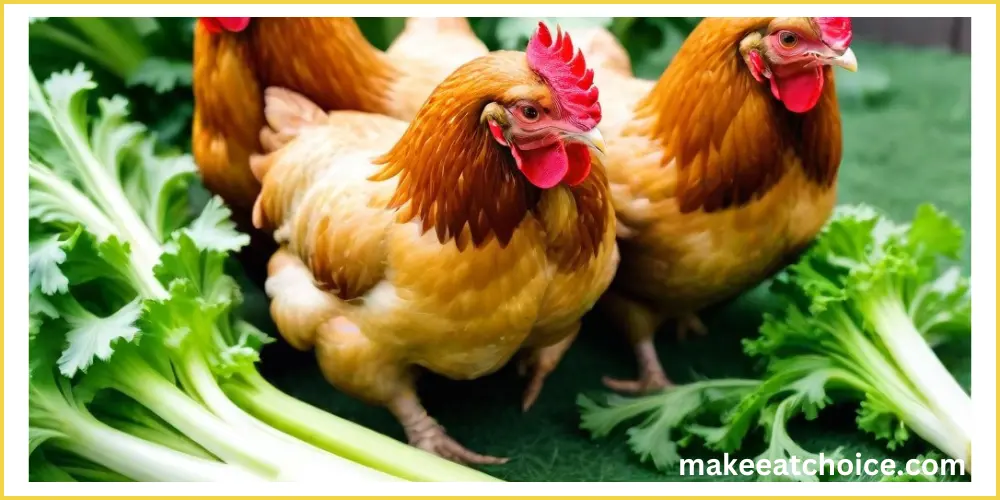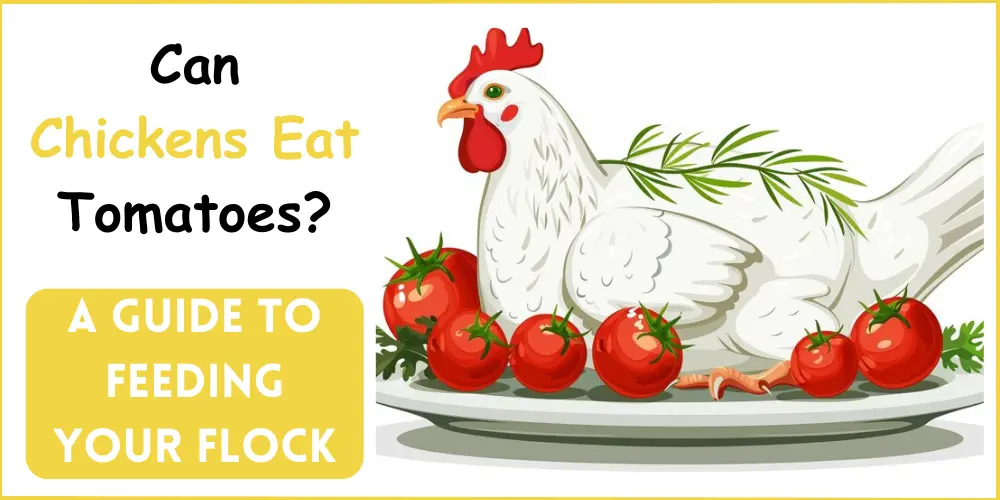
Ensuring their feathered companions consume a balanced and nourishing diet is equally vital to backyard poultry owners attending to their health regimen. Each morsel that enters their expansive coops and enclosures, from seeds to scraps, has been evaluated for its potential advantages and disadvantages.
This definitive nutritional guide will address the age-old question of whether or not poultry can consume celery and examine its superfood status.
Can Chickens Eat Celery?
Chickens may incorporate celery into their diet in a moderate manner. Vitamins A, C, and K are abundant in celery, which provides vital nutrients for the health of poultry. Although celery can be consumed in its entirety by poultry, it is imperative to provide it in suitable portions to avoid any potential digestive complications.
Chickens can eat celery in moderation; it’s a nutritious addition to their diet. Ensure it’s fresh, and chopped into small pieces to prevent choking hazards.
Due to its minimal caloric and riboflavin content, celery is a nutritious treat for your flock. Observing their reaction to novel foods is crucial, and dietary guidance from a veterinarian is advised.
Individuals can augment their nutritional requirements by integrating celery into a well-balanced diet and contribute to their general health.
Ensure that the celery is adequately prepared and provided in moderation to maintain the health and happiness of your poultry.
Understanding Chicken Nutrition
Defining what constitutes a nutritious diet for chickens is essential before discussing whether celery should be included in a chicken’s diet. Chickens, being omnivores with a wide range of tastes, necessitate a harmonious combination of protein, carbohydrates, vitamins, and minerals for optimal health, much like human beings.
Proteins are indispensable for developing muscle tissue, carbohydrate-rich diets supply the energy poultry requires foraging and egg-laying, and vitamins and minerals are critical for their general well-being. Generally, a comprehensive poultry feed comprises every one of these advantageous components. However, can celery supplement your chicken diet further?
Introducing Celery to Chickens
Celery is uncommon in commercial poultry feed, but that does not mean it harms chickens. Instead, its inconspicuousness does not reflect any potential danger it poses to them. However, celery can benefit a chicken’s nutrition if you wish to increase its variety.
Celery Is Healthy For Chickens
Vitamins and minerals essential for chicken health are abundant in celery, including vitamins K, C, and potassium. Its minimal fat content makes it an excellent option for chickens watching their weight. However, one notable advantage of celery is its high fiber content. It can facilitate digestion and avert a phenomenon known as “crop binding,” in which food particles impede the efficient passage of substances through the chicken’s digestive tract, potentially culminating in a blockage.
What Celery Components Are Suitable For Chickens To Consume?
All components of the celery plant are deemed safe for chicken consumption, including stalks, leaves, seeds, and roots. It is among the few vegetables that can be administered to a flock without causing toxicity concerns.

How to Feed Chickens Celery
When introducing celery or any other new food to chickens, do so progressively so as not to upset their delicate stomachs. Begin with modest quantities and gradually escalate them to observe their responses. If your poultry prefers celery, you may introduce it into their diet consistently.
Feeding Chickens Celery
Chickens must consume a variety of foods to remain healthy. Celery may be included in such a diet but should only constitute some of it. Small portions of celery should be provided to your poultry a few times per week, treating it as a nutritious snack. It is simple to distribute a solitary stalk of celery among several poultry.
Nutritional Composition and Benefits
Approximately 95% of celery is water, making it hydrating and a welcome delicacy, particularly during hot weather. The residual composition comprises vital vitamins and minerals, as well as fiber, which aids in digestion.
The complete list of vitamins and minerals in celery includes:
- Vitamin A
- Vitamin C
- Vitamin K
- Vitamin B6
- Folate
- Potassium
- Molybdenum
- Dietary fiber
A single celery stalk contains only a few calories, making it an excellent choice for poultry watching their weight and not wanting to consume empty calories.
Alternatives and Complementary Foods
Although celery can undoubtedly be incorporated into a chicken’s diet, variety is essential. Berry pulp, kale, and carrots are some additional fruits and vegetables that are secure to consume. Additionally, grains such as maize and oats are nutritious feed supplements for chickens.
Be mindful to progressively introduce new foods to your flock in small quantities while looking for any indications of distress.
Related:
FAQs
Can Chickens Eat Celery Raw?
Chickens may indeed consume uncooked celery. It is the simplest method to administer it to your flock. Uncooked celery has the potential to impart additional hydration and nutrients that may be lost during preparation.
What Vegetables Chickens Cannot Eat?
There are certain vegetables that poultry should not consume due to their toxicity or potential to induce gastric distress. These may contain toxic alkaloids, including unripe tomatoes, green potatoes, and tomato leaves.
Can Chickens Eat Celery Pulp?
You may wonder if you own a juicer and whether or not poultry can consume celery pulp. Indeed, the answer is affirmative. Celery should also be safe for your poultry, including the pulp left over from the juicer.
Can Chickens Eat Raw Rice?
Yes, rice, including raw rice, is safe for chickens. It’s a gentle food that can even help settle a stomach.
What Does Celery Do for Chickens?
Celery is rich in vitamins and minerals and can help with hydration and digestion.
Can Chickens Eat Carrots or Celery?
Yes, chickens can eat carrots as well. Carrots are a good source of beta-carotene, which chickens can convert into vitamin A. They’re also high in fiber, which is good for digestion.
Conclusion:
Celery can be an effective dietary supplement for backyard poultry seeking to ensure they receive all the necessary vitamins and minerals. In addition to being nutrient-dense and low in calories, it may also facilitate digestion. Keep in mind that variety is the foundation of a nutritious chicken diet. Incorporate celery into their regular diet as an additional treat, and consistently monitor the response of your flock to novel dietary components. You may earn the gratitude of your poultry with a few extra eggs.
References:
- By Ally, Can Chickens Eat Celery? Posted On January 24, 2023.
- By HappyChicken, Can Chickens Eat Celery? Posted on December 4, 2019.



